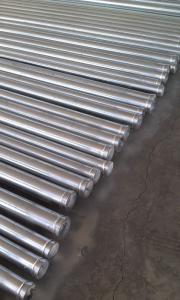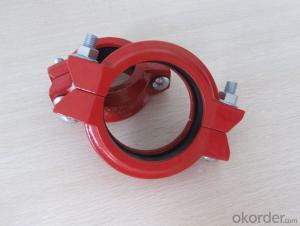shouldered grooved pipe with coupling
- Loading Port:
- China Main Port
- Payment Terms:
- TT OR LC
- Min Order Qty:
- -
- Supply Capability:
- -
OKorder Service Pledge
OKorder Financial Service
You Might Also Like
Product Name | Shouldered Grooved pipe |
Outside Diameter(mm) | 60.3mm-425mm |
Wall thickness(mm) | 2mm-20mm |
Certification | FM/UL; SGS/BV |
Standard | 1.ASTM A106/A53 GR.A; ASTM A106/A53 GR.B; ASTM A53/A106 GR.C 2.APL 5L GR.B, API 5CT J55, K55, N80 3.ASTM, BS,DIN, EN |
Grade | A, B, C, ST33, ST37, ST35.8, ST45-8, ST45-4, ST52 |
Place of Origin | Hebei Cina |
Face finished | 1.Manual polished 2.mechanical polished 3.black paint on the face 4.Shoulder Grooved on both ends 5.Galvanized or Colour Painting |
Export | Europe, South America, the Middle East, Africa, Asia and other countries and regions, well received by consumers! |
Process Method | 1.Cold Drawn 2.Cold rolled 3.Hot rolled 4. Hot expanded |
Application | Tube with hollow cross-section, a large number of channels for transporting fluids, such as the transportation of oil, natural gas, gas, water and some solid materials, pipes, etc.. |
Package | 1.Inner Packing:Caps at both ends, steel strong trips on every bundle 2.Outer Packing:Standard export package or as per clients' requirements |
- Q:How are steel pipes used in the manufacturing of food and beverage processing plants?
- Steel pipes are commonly used in food and beverage processing plants for various purposes such as transporting liquids, gases, and steam. They are used to create a network of pipelines that facilitate the movement of raw materials, ingredients, and finished products throughout the manufacturing process. Steel pipes are chosen for their durability, corrosion resistance, and ability to withstand high pressure and temperature conditions, ensuring the safety and efficiency of food and beverage production.
- Q:What's the actual size of the DN25?
- Steel pipe is not only used to transport fluid and powder solid, exchange heat energy, and manufacture mechanical parts and containers, but also is an economic steel. It can reduce weight and save 20 to 40% of metal by using steel pipe to make building structure, network frame, prop and mechanical support. Moreover, it can realize factory mechanization construction. Using steel pipe to manufacture road bridge can not only save steel, simplify construction, but also greatly reduce the area of coating protective layer, save investment and maintenance cost.
- Q:What are the alternatives to steel pipes for various applications?
- Some alternatives to steel pipes for various applications include PVC (polyvinyl chloride) pipes, copper pipes, aluminum pipes, and fiberglass pipes. Each alternative has its own advantages and disadvantages, such as cost, durability, and resistance to corrosion, which make them suitable for specific applications.
- Q:Can steel pipes be used for transporting hazardous materials?
- Yes, steel pipes can be used for transporting hazardous materials. Steel pipes are known for their strength, durability, and resistance to corrosion, making them suitable for handling various types of hazardous substances. Additionally, steel pipes can be designed to meet specific requirements, such as pressure ratings and chemical compatibility, ensuring the safe transport of hazardous materials. However, it is crucial to consider additional safety measures and comply with relevant regulations to minimize any potential risks associated with transporting hazardous materials.
- Q:What is a tight steel tube?
- The fully enclosed steel tube is called "sleeve connection steel pipe". The English abbreviation is JDG. The sleeve between the pipe and the pipe is fastened by screws. The current specification is the construction and acceptance rules of CECS 120:2007 sleeve steel conduit pipe line
- Q:What is DN50 for welded pipe?
- Commonly used in the market DN50 seamless steel pipe, the outer diameter has two specifications: A, 57mm, B, 60mm, if no special instructions, commonly used is 57mm. The outer diameter of the welded pipe is only 60mm this specification.
- Q:How are steel pipes used in the manufacturing of agricultural machinery?
- Steel pipes are commonly used in the manufacturing of agricultural machinery as they are strong, durable, and resistant to corrosion. They are used to create the framework and structural components of various agricultural equipment such as plows, tillers, planters, and harvesters. Steel pipes provide stability and strength to these machines, allowing them to withstand heavy loads and operate efficiently in tough farming conditions.
- Q:What is the elasticity of steel pipes?
- The elasticity of steel pipes refers to their ability to deform under external forces and return to their original shape once the force is removed. Steel pipes are known for their high elasticity, which enables them to withstand various forms of stress and strain without permanent deformation. This property is crucial in applications where pipes are subjected to pressure, bending, or other mechanical forces. The elasticity of steel pipes is determined by the material properties of steel, such as its Young's modulus, which is a measure of its stiffness and ability to resist deformation.
- Q:How are steel pipes used in offshore drilling platforms?
- Steel pipes are used in offshore drilling platforms for various purposes. They are primarily used as conduits for the transportation of drilling fluids, such as mud and cement, to and from the drilling rig. Steel pipes are also crucial components in the construction of risers, which connect the wellhead to the drilling rig, allowing for the extraction of oil or gas. Additionally, steel pipes are utilized in the installation of subsea pipelines, which transport the extracted hydrocarbons to onshore processing facilities. Overall, steel pipes play a vital role in the efficient and safe operation of offshore drilling platforms.
- Q:What are the different types of steel pipe supports for offshore platforms?
- There are several types of steel pipe supports commonly used for offshore platforms, including but not limited to: 1. Clamps: These are used to secure and fasten pipes to the support structure, providing stability and preventing movement. 2. Hangers: These are used to suspend pipes from the support structure, allowing for flexibility and reducing stress on the pipes. 3. Guides: These are installed to control the movement and alignment of pipes, ensuring they stay in place and prevent damage during operation. 4. Shoes: These are used to support and distribute the weight of the pipe, typically at points where the pipe intersects with the support structure. 5. Saddles: These are designed to cradle the pipe and provide support, typically used for horizontal or inclined pipes. Each type of steel pipe support serves a specific purpose in ensuring the integrity and functionality of the offshore platform's piping system.
1. Manufacturer Overview |
|
|---|---|
| Location | |
| Year Established | |
| Annual Output Value | |
| Main Markets | |
| Company Certifications | |
2. Manufacturer Certificates |
|
|---|---|
| a) Certification Name | |
| Range | |
| Reference | |
| Validity Period | |
3. Manufacturer Capability |
|
|---|---|
| a)Trade Capacity | |
| Nearest Port | |
| Export Percentage | |
| No.of Employees in Trade Department | |
| Language Spoken: | |
| b)Factory Information | |
| Factory Size: | |
| No. of Production Lines | |
| Contract Manufacturing | |
| Product Price Range | |
Send your message to us
shouldered grooved pipe with coupling
- Loading Port:
- China Main Port
- Payment Terms:
- TT OR LC
- Min Order Qty:
- -
- Supply Capability:
- -
OKorder Service Pledge
OKorder Financial Service
Similar products
New products
Hot products
Related keywords






























